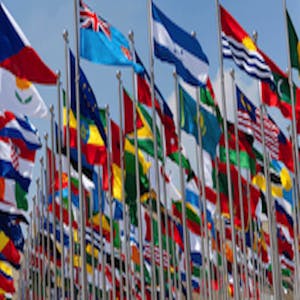The Changing Global Order
How are international power relations changing and how can global peace and stability be maintained? This course familiarizes you with some main theories of international relations, shows how the global order is gradually changing and discusses how selected international and regional organizations contribute to the maintenance of global peace and security. You learn what research findings tell us in terms of the capacity of international organizations and actors to help prevent or stop violent conflict, what tools are used to negotiate agreements and how foundations for sustainable peace are best created. We will also focus on the role of the European Union in terms of diplomacy and efforts to prevent conflict, the North Atlantic Treaty Organization and the contribution of organizations such as the African Union to the prevention of conflict and war. We will study the United Nations Security Council and see in which ways its membership could be adapted to more accurately reflect the power relations of the current global order. Through quizzes and exercises testing your knowledge of these subjects, you will understand crucial concepts and get insights into how the academic study of international relations and international organization contributes to the search for global stability and peace in practice.
None
Syllabus
Syllabus - What you will learn from this course
Week 1
Welcome to the course
Theories of International Relations
Week 2
The Changing World Order: Rising Powers and International Institutions
Week 3
Conflict, Conflict Resolution and Security
Week 4
Regional Organizations in Global Affairs
Week 5
NATO in a Changing World
Week 6
Reforming the UNSC: Strategies and Proposals
Week 7
Handing in the UNSC Reform Groups Proposals
FAQ
When will I have access to the lectures and assignments?
Access to lectures and assignments depends on your type of enrollment. If you take a course in audit mode, you will be able to see most course materials for free. To access graded assignments and to earn a Certificate, you will need to purchase the Certificate experience, during or after your audit. If you don't see the audit option:
The course may not offer an audit option. You can try a Free Trial instead, or apply for Financial Aid.
The course may offer 'Full Course, No Certificate' instead. This option lets you see all course materials, submit required assessments, and get a final grade. This also means that you will not be able to purchase a Certificate experience.
What will I get if I purchase the Certificate?
When you purchase a Certificate you get access to all course materials, including graded assignments. Upon completing the course, your electronic Certificate will be added to your Accomplishments page - from there, you can print your Certificate or add it to your LinkedIn profile. If you only want to read and view the course content, you can audit the course for free.
Is financial aid available?
Yes. In select learning programs, you can apply for financial aid or a scholarship if you can’t afford the enrollment fee. If fin aid or scholarship is available for your learning program selection, you’ll find a link to apply on the description page.
Reviews
Thank you so much, Prof Hosli and Coursera. Very informative course, quizzes challenging, since I haven't studied before IR. I love it!
I loved the course. introductory but very well made. Congratulations to the professors of Leiden Universiteit.
Some excellent content, but the teachers could be a little more dynamic. Some of the "guest lecturers" were tedious.
The changing global order is a great course to get deep insight of contemporary geopolitical issues of international relations.
